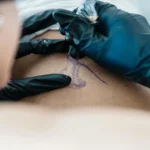
Tattoos: A Timeless Journey
December 30, 2024
Tattoos and Skin Health: Your Ink, Your Health
January 18, 2025Tattoos and Medical Conditions? What You Need to Know

Getting a tattoo is a popular form of artistic expression. But before you decide to get a new design, it's crucial to consider your health. If you have any medical conditions, it's important to consult with a healthcare professional before getting inked.
Why is it important to consult a doctor?
- Infection risk: Some medical conditions can weaken your immune system, increasing the risk of infection during and after the tattooing process.
- Allergic reactions: Tattoo inks can cause allergic reactions in people with certain sensitivities.
- Healing complications: Conditions like diabetes or blood clotting disorders can affect your skin's ability to heal properly.
- Medication interactions: Some medications can interfere with blood clotting or increase your skin's sensitivity to ink.
Medical conditions that can affect your decision to get a tattoo
- Skin conditions: Psoriasis, eczema, vitiligo, etc.
- Blood clotting disorders: Hemophilia, von Willebrand disease.
- Weakened immune system: HIV, cancer, immunosuppressive treatments.
- Diabetes: Especially if it's not well-controlled.
- Heart conditions: Certain heart problems can increase the risk of complications.
- Pregnancy: It's advisable to avoid tattoos during pregnancy and breastfeeding.
What questions should you ask your doctor?
- Does my medical condition prevent me from getting a tattoo?
- What precautions should I take before, during, and after getting a tattoo?
- What type of ink is safest for me?
- What should I do if I have an adverse reaction?
Remember, everyone is different, and what works for one person may not work for another. Always consult your doctor for a personalized assessment.
Additional tips:
- Find a clean, licensed tattoo shop.
- Make sure the tattoo artist uses sterilized needles and equipment.
- Follow aftercare instructions for your tattoo.
- Watch for any signs of infection and consult a doctor if necessary.
Getting a tattoo can be a wonderful experience, but safety should always be your priority. By making informed decisions and consulting with the right professionals, you can enjoy your new tattoo without worry.

